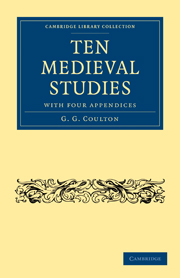Book contents
- Frontmatter
- PREFACE TO FIRST EDITION (1906)
- PREFACE TO SECOND EDITION (1915)
- PREFACE TO THIRD EDITION
- Contents
- I The Monastic Legend
- II A Revivalist of Six Centuries Ago
- III Side-Lights on the Franciscans
- IV The High Ancestry of Puritanism
- V Romanism and Morals
- VI The Truth about the Monasteries
- VII Religious Education before the Reformation
- VIII Priests and People before the Reformation
- IX The Failure of the Friars
- XIII The Plain Man's Religion in the Middle Ages
- Appendices
- Index
XIII - The Plain Man's Religion in the Middle Ages
Published online by Cambridge University Press: 07 September 2010
- Frontmatter
- PREFACE TO FIRST EDITION (1906)
- PREFACE TO SECOND EDITION (1915)
- PREFACE TO THIRD EDITION
- Contents
- I The Monastic Legend
- II A Revivalist of Six Centuries Ago
- III Side-Lights on the Franciscans
- IV The High Ancestry of Puritanism
- V Romanism and Morals
- VI The Truth about the Monasteries
- VII Religious Education before the Reformation
- VIII Priests and People before the Reformation
- IX The Failure of the Friars
- XIII The Plain Man's Religion in the Middle Ages
- Appendices
- Index
Summary
Since all civilization is a matter of comparison, and O since every criticism of the past is by implication a criticism of our own age also, it is most important to make up our minds as to the real place of the Middle Ages in human evolution. A priori, all believers in human progress would expect the period to be better than antiquity, and worse than our own time. But we may not write history like this; we must check à priori considerations at every point by recorded facts; and, while surviving records have led some men to conclude that the Middle Ages were actually inferior to antiquity, others again believe that they were, on the whole, superior even to modern times. Very few would care to go back to them, but many argue, either explicitly or implicitly, that an age in which religion dominated all society was necessarily a greater age than this of ours; and that, however much we may have gained in many ways, we have lost, and are still losing, the Pearl of Price. Newman was one of the few who have dared to put this boldly and uncompromisingly; but very many seem to reason implicitly from some such premises, and still more seem to halt between two opinions. For the study of medieval history, therefore, one of the first requisites is to face this question, and to decide it as far as possible for ourselves. Medieval Europe accepted one single creed and one set of religious forms; was it, so far, more developed or less developed than we? Now, if we are to be quite frank here, we must begin by being frank with ourselves.
- Type
- Chapter
- Information
- Ten Medieval Studieswith Four Appendices, pp. 189 - 200Publisher: Cambridge University PressPrint publication year: 2010First published in: 1930



